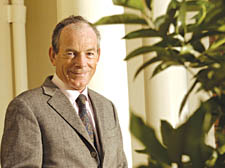|
|
 |
| |

Sir Simon Jenkins: ‘There is a real challenge to be faced on the future of the British countryside’ |
Putting trust in Sir Simon over our heritage
New National Trust chairman Sir Simon Jenkins wants to challenge ‘precious’ protocol and get his boots muddy, writes Gerald Isaaman
HE may be seen as an urban guerrilla – “I love London,” he insists – but Sir Simon Jenkins has now taken on the role of protector of Britain’s architectural heritage and visual landscape as the new chairman of the National Trust.
It’s a post for which he was headhunted – one of up to 30 potential candidates – and one that he didn’t take too seriously, mainly because of the time involved in the hectic life of a freelance journalist who has edited the Evening Standard and The Times.
“Then I got interested when they got down to the shortlist of four or five, and I realised it would be something wonderful to do,” he told me. “I’m impressed by the NT’s sheer size, its range and its enormous success. And it is a very effective organisation, the second largest charity in the country with 3.6 million members.”
Jenkins applauds the fact that the NT is in excellent financial shape, but realised that now is not the time to go on a buying spree of mansions in danger – it is the countryside and uplands that are in need of NT protection rather than stately homes.
As he points out, the NT has done well in past recessions, increasing the millions of visitors to its 300 numerous sites.
As a past critic of the NT, 65-year-old Jenkins, who has spent more than half his life living in Primrose Hill, may well cause a few shockwaves, especially as he was the only chairman candidate who has visited every NT site in the country.
That was all part of his excellent accounts in England’s Thousand Best Houses and England’s Thousand Best Churches, though he admits: “I am something of a learner when it comes to the countryside.”
What he wants to challenge is the somewhat precious “NT look” some of its properties have and some of the knee-bending bureaucratic attitudes to stifling health and safety rules. His passion is to “breathe some life” into showcase museum-like mansions so that visitors can enjoy the eccentricity of their former owners.
“It’s hard to keep the feel of life in a heritage house,” says Jenkins. “Just as a church is designed for worship, a house is designed to be lived in. If it’s not, it is less of a house.
“I hate a dining room where no one eats, a kitchen where no one cooks and a ballroom where no one dances. If we have a billiard table, shouldn’t we play billiards? If you have piano in the music room, shouldn’t you be able to play the piano?”
And he declares: “The compliance culture is a menace. It has become bureaucratic, time-consuming, unnecessary and expensive. Our staff feel boxed in by gratuitous compliance with rules that are applied across the board.”
What he would like to see are more off-beat sites such as the Beatles houses in Liverpool, a row of back-to-back houses in Birmingham now owned by the NT, and Erno Goldfinger’s old Bauhaus- style home in Willow Road, Hampstead.
“These are the places where you can feel the atmosphere,” he declares. “I want to promote more the atmosphere of the place than the history. People do enjoy their eccentricity.”
As a journalist, Jenkins has rare experience in that he has been an active board member of organisations such as British Rail and the Millennium Commission, a co-founder of the preservation group Save and an active patron of the Heath and Hampstead Society. That makes him well aware of the need to push boundaries.
“I’d like to see the trust recognise the specific identities of Wales and Northern Ireland,” he says. “And there is a real challenge to be faced on the future of the British countryside. It is now threatened in the way in which, post-war, the country house was. The next decade will be about muddying our boots.”
He is aware that the NT is not labelled as “political” when it tackles conservation dilemmas. The projected third runway at Heathrow is a typical example, for, as he recognises, NT members also use airplanes like everyone else and may not universally agree with any reduction in flights, as climate change campaigners demand.
But, he concedes, “People become NT members because they have a wider belief in traditional British attitudes. So we do have an affinity of interest that can be shared.”
www.nationaltrust.org.uk |

|
 |
|
 |
|

